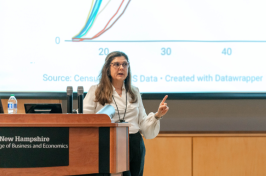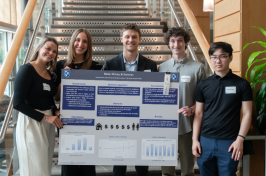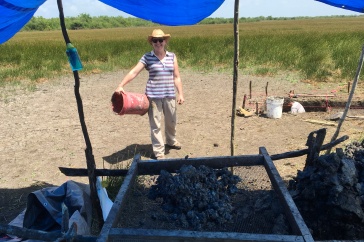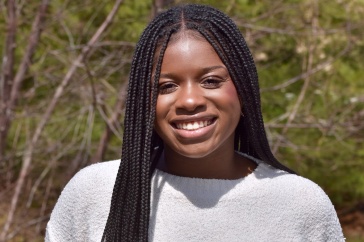
David Kaye, theatre professor and chair of the theatre and dance department, will perform his one-man play “How I Brought Peace to the Middle East?” Friday, Nov. 13, at New York’s United Solo theatre festival, a juried event billed as the largest solo festival in the world.
In 2011, Kaye traveled to Israel on a Fulbright award where he, his wife and two daughters spent six months living about 20 miles from the Gaza Strip. He wrote the play “How I Brought Peace to the Middle East?” based on his time there.
UNH Today recently sat down with Kaye to talk about his play.
UNH Today: This play was inspired during your trip to Israel with your family. Was there a particular incident that was the catalyst?
David Kaye: Much of my Fulbright proposal was based on theatre and peacemaking and I had planned on creating a solo play, so the idea had been living in my brain for a while. Then, we came home, three years went by, and it was still gnawing at me that I hadn’t done something I’d planned to do. Meanwhile I was telling stories about the things that had happened during those six months [like, the city where they were living coming under rocket attack] and came to realize it had been a test of my optimism. That’s what the play is about, that test.
UNH Today: How hard is it to do a one-man play?
Kaye: It’s a very, very difficult experience. There is no one to save you — it’s kind of thrilling. And it’s exhausting. Originally, “How I Brought Peace to the Middle East?” was two hours long, with an intermission. When I perform it in New York, it will be 80 minutes without an intermission.
UNH Today: Do you think the arts can help unify people who have opposite ways of viewing the world?
Kaye: Theatre is kind of built on the concept of empathy. You learn to see the world through someone else’s eyes even if you disagree with what they see. That’s something theatre does really, really well.
I think the only path to a lasting resolution (in the Middle East) on all sides is seeing one another as human. Theatre is humanness as art. Can that have an impact? Will it change the world? Maybe that’s setting our sights high but it can’t hurt. It’s still better to do something than nothing. If we throw up our hands then there really is no hope.
UNH Today: Can you give us your thoughts on how plays and films can be used to reach/teach people?
Kaye: Theatre may be so-so at delivering information but it is really good at asking us to look at ourselves. And without taking an honest look at ourselves, we can’t make strides toward peace.
Film is literal; theatre is symbolic. There are positives to both. I think theatre offers the opportunity to look at the bigger questions. (Pulitzer Prize and Tony Award–winning American playwright) John Patrick Shanley said, “Theatre is a safe place to do the unsafe things that need to be done.”
UNH Today: “How I Brought Peace to the Middle East?” is a tragicomedy. Is it hard for some of us to see the humor in a situation?
Kaye: We have to find the humor because humor is a big part of being human. It’s at the absolute heart of finding peace — the commonality we all have. If we can laugh at something together, it makes it hard to hate the other person after that.
“How I Brought Peace to the Middle East?” premiered in 2014. Kaye’s most recent performance was at the West End Studio in Portsmouth.
-
Written By:
Jody Record ’95 | Communications and Public Affairs | jody.record@unh.edu

















































